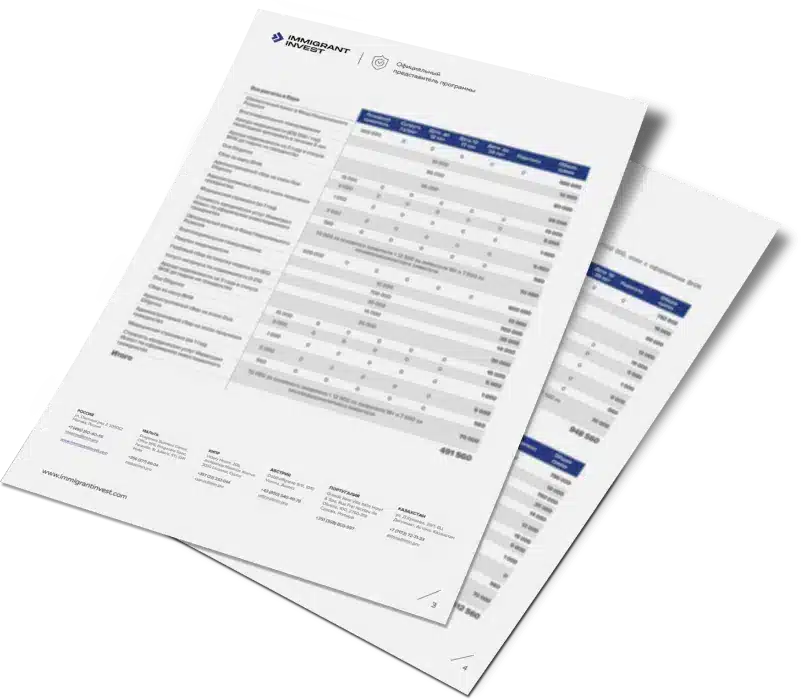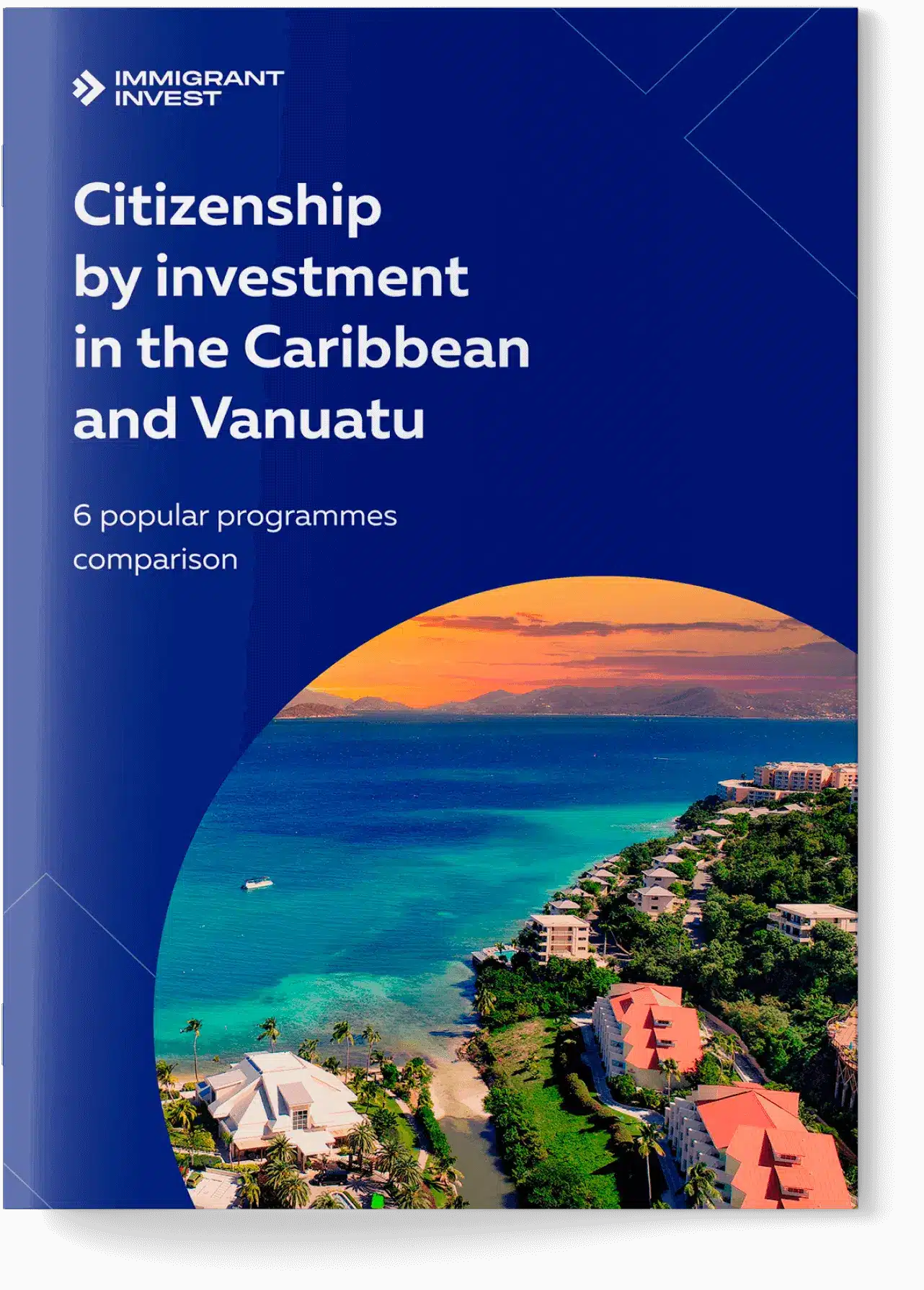More and more passports issued by Caribbean states and Vanuatu are obtained by investment. Wealthy individuals contribute to the countries’ economies and, in exchange, receive citizenship.
Requirements for other paths include:
- permanently living in the chosen country — for citizenship by naturalisation;
- proving kinship with a country’s national — for a passport by family reunification;
- being born in one of the countries — for citizenship by descent.
Caribbean and Vanuatu citizenship laws that regulate paths to citizenship
Citizenship by investment
Investors can get Caribbean citizenship by participating in government programs. Countries offering such opportunities include Antigua and Barbuda, Dominica, Grenada, St Lucia, and St Kitts and Nevis. A similar program is in place in Vanuatu.
Citizenship by investment is the fastest way to gain travel freedom and is suitable for high‑net‑worth individuals.
Obtainment period. Investors can obtain passports within 2—9 months in exchange for contributing to the country’s economy.
Investment. Caribbean program participants can contribute to a state fund or purchase real estate. On the other hand, Vanuatu offers only one option — a state fund contribution.
Comparison of Caribbean and Vanuatu citizenship by investment programs
| Country | State fund investment | Real estate investment | Obtainment period |
| Antigua and Barbuda | $100,000+ | $200,000+ | 3—6 months |
| Dominica | $100,000+ | $200,000+ | 3—6 months |
| Saint Lucia | $100,000+ | $200,000+ | 4+ months |
| Vanuatu | $130,000+ | — | 1—2 months |
| Grenada | $150,000+ | $220,000+ | 6+ months |
| St Kitts and Nevis | $250,000+ | $400,000 | 6+ months |
Alternative options. In addition to investing in real estate or government foundations, the citizenship programs of Antigua and Barbuda, St Lucia, St Kitts and Nevis, and Vanuatu offer other options:
- Antigua and Barbuda provide an opportunity to contribute at least $150,000 to the University of the West Indies Fund for families of six or more or to invest at least $1,500,000 in a local business.
- Saint Lucia offers the option of buying government bonds for at least $300,000 or investing in local businesses starting from $100,000.
- St. Kitts and Nevis allow investment in an Approved Public Benefits Project with a minimum sum of $250,000.
- Vanuatu citizenship can be obtained by purchasing shares in a CNO Future Fund holding company for $157,000 or more.
Eligibility requirements. To participate in the program, the investor must be over 18, have no criminal record, and have a legal source of income.
Investors may optionally include family members in the application: their spouses, children, and parents. Antigua and Barbuda, Grenada, and St. Lucia also allow the addition of siblings, while Dominica permits, including grandparents.
Documents. The documents required from the investor depend on their background, but the list usually includes:
- a passport;
- a birth certificate;
- a marriage certificate;
- bank statements;
- a police clearance certificate;
- passport-size photos.
The investor might be required to provide additional documents.
How to obtain Caribbean citizenship by investment: a step-by-step guide
The process of getting Caribbean citizenship by investment varies depending on the chosen country. The minimum processing time is 1 month under the Vanuatu programme.
Before signing an agreement with an investor, Immigrant Invest conducts preliminary Due Diligence. Our Compliance Department checks the investor’s background to identify potential risks of refusal. If any are found, lawyers provide alternative solutions.
The check is completely confidential, and the investor must only provide a passport. Ultimately, preliminary Due Diligence helps to reduce the risk of rejection to 1%.
After signing the agreement, lawyers prepare a list of required documents the applicant must collect. These documents are translated and notarised, and government forms are filled out.
The documents are sent to the specific country’s Citizenship by Investment (CBI) Unit.
The authorities of the chosen country check the investor and their family members against international databases and the Internet.
All applicants over 16 undergo an interview, which might be conducted in English or another language of the investor’s choosing.
Vanuatu is the only country that doesn’t require applicants to take an interview.
The foreigner makes an investment after the CBI Unit approves their application.
The CBI Unit issues passports and naturalisation certificates after the investment is made. A courier delivers them to a convenient address.
By naturalisation
Long-term residence is the primary requirement for those wishing to obtain citizenship by naturalisation in a country. An applicant first obtains a residence permit and lives in the country for several years, assimilating and undergoing cultural adaptation. Then, if they wish, they can obtain a passport by naturalisation.
The general eligibility criteria for Caribbean citizenship by naturalisation are:
- legally live in a chosen country for a specific number of years and plan to continue residing there;
- hold a valid residence permit;
- speak English;
- understand the rights, privileges and responsibilities of citizens;
- be of good character
- not pose a threat to the country.
When applying for citizenship by naturalisation, foreigners typically need to provide the following documents: a completed government form, a birth certificate, a police clearance certificate, a bank statement, and passport-size photos.
The process of obtaining a Caribbean passport by naturalisation generally consists of several steps:
- Meet the requirements for obtaining a temporary residence permit, such as a work permit for working in the country.
- Obtain a temporary residence permit and live in the country for a specified number of years.
- Apply for permanent residence and continue living in the country.
- File an application for citizenship.
- Take the Oath of Allegiance.
Immigration services check all applicants, verifying the legality of their income and the absence of criminal records.
How long one needs to live in the country to get citizenship by naturalisation
| Country | Minimum length of stay |
| Antigua and Barbuda | 7 years |
| Dominica | 7 years |
| Grenada | 7 years |
| Saint Lucia | 7 years |
| Vanuatu | 10 years |
| Saint Kitts and Nevis | 14 years |
By birth
A person born in a Caribbean country is granted citizenship automatically. For example, if a child is born in Antigua and Barbuda, they will automatically become a citizen of Antigua and Barbuda.
Exception: citizenship is not granted if one of the parents has diplomatic immunity or is a citizen of a state with which the country is at war.
To ensure the child is recognised as a full-fledged citizen, their parents must provide a birth certificate to the authorities responsible for registering all newborns.
By descent or family reunification
Caribbean citizenship can be obtained through family ties if kinship is proven with appropriate documents.
Parents are Caribbean citizens. In Antigua and Barbuda, Grenada, Dominica, Saint Kitts and Nevis, and Saint Lucia, passports can be obtained if at least one parent holds Caribbean citizenship. In Vanuatu, a child becomes a citizen only if their father is a Vanuatu citizen.
Grandparents are Caribbean citizens. Antigua and Barbuda and Saint Kitts and Nevis allow individuals to obtain citizenship if at least one of the applicant's grandparents was or is a citizen of the country.
The spouse is a Caribbean citizen. The applicant can obtain Caribbean citizenship if their spouse is a citizen of one of the Caribbean countries. Moreover, it does not matter how the Caribbean spouse obtained their citizenship; it could have been by any means, not only by birth.
A foreign spouse of a Caribbean national must reside with their partner for at least three years on a residence permit before they can apply for citizenship. The method of getting citizenship by marriage remains valid if the Caribbean spouse has passed away.
Two countries have specific requirements regarding the duration of the marriage:
- Antigua and Barbuda requires that an applicant has been married to a national of the country for at least three years.
- The Vanuatu condition applies specifically to men; they must have been married to a Vanuatu citizen for at least 10 years.
Adoptive parents are Caribbean citizens. Suppose a citizen of Antigua and Barbuda, Grenada, Dominica, Saint Kitts and Nevis, or Saint Lucia adopts a child from another country. In that case, the child is granted citizenship of that specific country. It does not matter whether the adopter is a mother or a father. In Vanuatu, a foster child can obtain citizenship if the foster father is a Vanuatu citizen.
Adopted children can become Caribbean nationals without prior residence in the country. Their adoptive parents must file an application on their behalf with the relevant authority.
Documents. The most critical document a foreigner must provide is one proving their ties to a Caribbean citizen, such as a marriage certificate. The applicant also needs to fill out government forms and prepare their birth certificate, ID document, and police clearance certificate.

Commonwealth country citizenship
Suppose an applicant is a citizen of one of the Commonwealth of Nations countries. In that case, they can apply for citizenship in Antigua and Barbuda, Grenada, Dominica, Saint Kitts and Nevis, or Saint Lucia.
Applicants must have been residents of the country where they want to obtain second citizenship for several years. The residency period for Commonwealth members is either the same as for naturalisation or may be shorter.
The number of years that a Commonwealth country citizen needs to live in the country to obtain second citizenship:
- Dominica — 5 years;
- Grenada — 5 years;
- Antigua and Barbuda — 7 years;
- Saint Lucia — 7 years;
- Saint Kitts and Nevis — 14 years.
The required documents for Commonwealth state citizens are the same as for foreigners from other countries seeking citizenship by naturalisation. These include an application, a birth certificate, a police clearance certificate, and bank statements.
The process is also the same and consists of five steps:
- Obtainment of a residence permit.
- Legal residence in the country.
- Obtainment of permanent residence and legal living with it.
- Citizenship application
- Oath of Allegiance.
How to get a second passport faster and with more ease
An investment program is the fastest way to get citizenship in one of the five Caribbean countries. A Caribbean passport is issued in 3—9 months. Getting citizenship by other means will take several years.
The Vanuatu program holds the record among Citizenship by Investment programs, as the country's passport can be obtained within one month.
Investors don’t have to reside in the country of their second citizenship. All other pathways require living in the country for several years. The only exception is Antigua and Barbuda, which requires investors to spend 5 days in the country during the first five years of citizenship.
Investors apply for second citizenship through a licensed agent, Immigrant Invest, which simplifies the process by eliminating bureaucracy, meaning applicants do not have to spend time preparing documents themselves. All other methods of obtaining citizenship involve a personal visit to the country’s immigration department, enduring long-term procedures, and bureaucratic delays.
A disadvantage of investment programs is the cost, which starts at $100,000.
Comparison of paths to Caribbean citizenship
| Path to citizenship | Obtainment period | Required residency period | Possibility to add family | Obtainment specifics |
| Citizenship by investment | 2—9 months | Not required | Yes | Investment of at least $100,000 |
| Naturalisation | 7+ years | 7+ years | No | English language proficiency |
| Birth | — | — | No | Birth in the country |
| Descent or family reunification | 3—10 years | 3—10 years | No | Kinship with Caribbean citizens |
| Commonwealth country citizenship | 5—14 years | 5—14 years | No | Citizenship from a Commonwealth of Nations country |
7 benefits of Caribbean citizenship for new passport holders
1. Increased global mobility. Citizens of Caribbean countries can enter the majority of countries, including those in Europe and Asia, without visas.
2. Business and tourist visas to the USA. Caribbean citizens can get a US B-1/B-2 tourist visa valid for 10 years. This visa allows them to stay there for up to six months a year for travelling or business meetings.
Grenadians can obtain an E-2 business visa, valid for five years, which allows them to live and conduct business in the USA without entry or exit restrictions.
3. Tax optimisation. Caribbean countries do not impose taxes on wealth, capital gains, or inheritance. Additionally, Antigua and Barbuda and St Kitts and Nevis do not levy taxes on personal income, while Grenada and St Lucia do not tax international income.
Companies registered in Vanuatu do not pay corporate tax.
4. Joining the Commonwealth of Nations. Caribbean countries are members of the Commonwealth of Nations, which provides additional benefits.
Citizens can benefit from special Commonwealth programs supporting businesses, such as the Public Debt Management program, which helps manage debts, and The Commonwealth Connectivity Agenda platform, which allows countries to exchange practices and experiences in trade.
Citizens holding Commonwealth passports may be employed in all non-reserved Civil Service posts in the United Kingdom and can enjoy preferential terms when applying to British universities. Some Commonwealth citizens may be eligible to live or work in the UK without immigration restrictions.
5. Banking services. With a Caribbean country passport, European banking services can be accessed more easily.
6. Dual citizenship. The Caribbean states allow their citizens to hold more than one passport, which means they are not required to renounce their other citizenship if their country of origin allows dual citizenship.
7. Extended rights in CARICOM states. Antigua and Barbuda, Dominica, Grenada, St Lucia, and St Kitts and Nevis are part of the Caribbean Community (CARICOM). This union has a single market that offers attractive opportunities for investors to run international companies.
Caribbean citizens can also travel around the CARICOM countries visa-free.
Key takeaways
- The easiest way to obtain Caribbean citizenship is by investment. The foreigner must only invest $100,000+ in the chosen country’s economy. The process of getting the Caribbean passport lasts from 1 to 9 months, depending on the state.
- The main requirements for the Caribbean passport by investment are that the investor is over 18, has no criminal record and has a legal income.
- Benefits of Caribbean citizenship by investment include visa-free travel to 140+ countries, an opportunity to get B-1/B-2 visas to the US, tax optimisation, education in the UK on preferential terms, and a right to have more than one passport.
- Other ways to become a Caribbean citizen are naturalisation, birth, descent, or family reunification.
- To apply for a Caribbean passport in a chosen country by naturalisation, a foreigner must live there for a specific number of years. The required period depends on the country but is at least 7 years. Citizenship by descent or family reunification is granted after at least 3 years of living in a chosen state.
Frequently Asked Questions
A Caribbean passport is obtained by birth, naturalisation, descent, marriage, Commonwealth citizenship, or government citizenship programs for investors.
Citizenship programs are the fastest way. Investors get passports within 2—9 months. They contribute to the country’s economy in exchange for a Caribbean passport. The minimum investment amount is $100,000. The state of Vanuatu provides the same opportunity.
The ability to travel freely in more than 140 countries around the world. The Schengen Area, the UK, China, Hong Kong, and Singapore are included in the list of visa-free destinations for citizens of Caribbean countries.
A US visa is another reason to get a Caribbean or Vanuatu passport. Passport holders can get a 10-year visa to the US.
A Caribbean country’s passport is obtained in 2—9 months by participating in citizenship investment programs. To compare, you need to live in the country for at least 7 years to get a Caribbean passport by naturalisation.
Caribbean citizenship investment programs don’t require applicants to stay in the country. They can get a passport and not live in the country at all. The exception is the Antigua and Barbuda Citizenship programs, where investors need to stay in the country for five days during the first five years of citizenship.
When a passport is obtained through a citizenship-by-investment program, applicants contribute to a Caribbean country’s economy in exchange for citizenship. The minimum contribution is $100,000 for a Caribbean program and $130,000 for the Vanuatu program.
Upon applying for citizenship by naturalisation, birth, or kinship, foreigners need to pay only state fees, up to $500 per person.
Caribbean state citizenship is granted to every child born on its territory, even if their parents are not citizens of this state.
A foster child obtains Caribbean citizenship if at least one of their parents is a national of that country. In Vanuatu, the adoptive father must be a citizen.
Anyone over 18 without a criminal record can use other ways to get a passport. At the same time, their situation must meet the legalisation requirements of one of the ways mentioned above.
Applicants who obtain Caribbean citizenship via an investment program must:
- be over 18;
- have no criminal record;
- have no visa or citizenship denials;
- have a legal income;
- pass Due Diligence.
The same requirements are imposed on the investor by the Vanuatu program.
A citizenship program applicant can include a spouse, children, parents, grandparents, and siblings in the application. Family members will receive passports together with the investor.
Antigua and Barbuda citizenship by investment program is a great option for families. An investor can include their spouse, children under 30, their — and the spouse’s — parents, and siblings in the application. The minimum investment is $100,000 for a family of four and $125,000 for a family of five or more people.
St Kitts and Nevis citizenship can be obtained in just 2 months. The lowest minimum investment requirements are in Antigua and Barbuda, Dominica or St Lucia.
Some Caribbean states allow dual citizenship. In five of these states — Antigua and Barbuda, Dominica, Grenada, St Kitts and Nevis, and St Lucia — there are government-run citizenship by investment (CBI) programs. In others, like Barbados and Belize, there are no CBI programs.
Yes, Caribbean passports are among the strongest in the world based on the freedom of movement alone. Passports of five Caribbean states allow visa-free entry to 140+ countries worldwide. This includes visa-free travelling within the Schengen Area, the UK, Hong Kong, and Singapore.
Grenada and Dominica citizens can also visit China and stay there for up to 30 days without a visa.
Now, the cheapest Caribbean by Investment programs function in Antigua and Barbuda, Dominica and St Lucia. The minimum investment is $100,000.
However, Antigua and Barbuda and Dominica will increase the investment threshold to $200,000 by June 30th, 2024.





 Zlata Erlach
Zlata Erlach